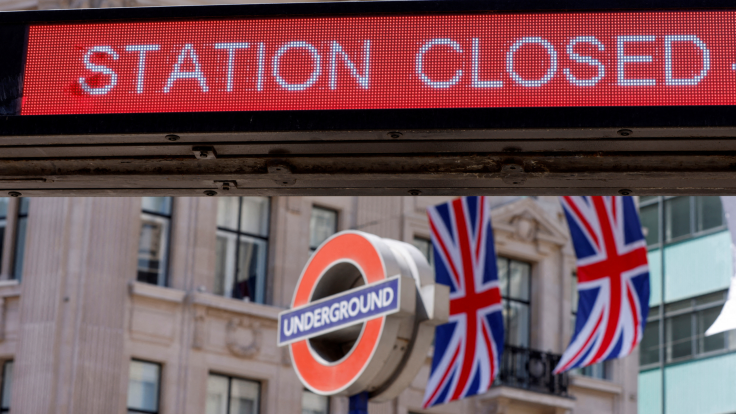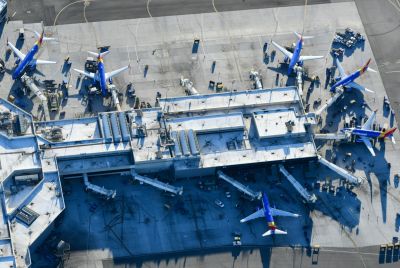Train Strikes London 2024: Dates, Ticket Refunds, Which Lines Are Affected
Many railway lines operating through London will be affected from strikes next month

The latest round of train and railway strikes is set to take place in the coming weeks and will subsequently affect those travelling around London.
The train strikes have occurred since the summer of 2022, with a large dispute between the train drivers' union, ASLEF, which currently represents 96 per cent of the nation's train drivers, and the train companies.
The discontent from the union primarily revolves around wanting increased pay and better working conditions.
Dates of train strikes in London
On Monday, Apr. 8, and Saturday, May 4, over 2000 ASLEF train drivers working on the London Underground will go on strike for 24 hours. This will likely halt the travel plans for those who plan to commute across the nation's capital on those dates.
The strike was commissioned after 98 per cent of the union workers at the London Underground voted in favour of the tube strikes.
In addition to the train strikes, National Rail workers of ASLEF will be striking for 24 hours from Apr. 5, 6, and 8. This means the first tube strike on the London Underground will coincide with the final striking day involving rail drivers.
In addition to the three dates, ASLEF revealed a six-day overtime ban will also be applied, whilst staff are refusing to work on their rest days from Thursday, Apr. 4 to Sunday, Apr. 6 and from Monday, Apr. 8 to Tuesday, Apr. 9. These strikes will see drivers at 16 rail companies walk out of from their train driving duties.
Which lines will be affected by the strikes?
The London Underground strikes will lead to most of the network being mainly inaccessible to commuters and possibly with no service during the striking days.
However, the Elizabeth Line, Overground lines and Docklands Light Railway are all set to be unaffected by the upcoming two London tube strikes but may be busier than usual.
Most of the companies affected by the rail strike operate through London and will, therefore, cause disruptions in and around the capital. These firms include Avanti West Coast, East Midlands Railway, CrossCountry, London North Eastern Railway, Greater Anglia, South Western Railway and Chiltern Railways.
Can affected passengers get a refund?
Travellers who purchased a ticket for a rail journey are entitled to receive their money back if their train is cancelled in the event of a strike. Also, those affected can use their original ticket for an alternative route or with another train firm.
There is a delay repayment scheme that can provide 100 per cent compensation for anyone who is a season ticket holder and has been affected by the strikes.
Transport for London does not hand out refunds for journeys affected by matters outside of their control, including strikes.
Why are the train strikes in London happening?
London Underground tube drivers will be striking on the two designated dates in April and May due to the lack of improvement in working conditions. ASLEF's full-time organiser on the London Underground, Finn Brennan, spoke out about the network's concerns in the ongoing dispute.
He mentioned: "They want drivers to work longer shifts, spending up to 25 per cent more time in the cab, and to remove all current working agreements in the name of 'flexibility and efficiency'. It's about getting people to work harder and longer for less."
Brennan added: "Management has also failed to deliver on commitments given to us on making drivers' cabs secure, on police numbers on Night Tube and on training. Our members simply don't believe what LU management tells them anymore."
The reason for the rail strikes is that ASLEF is unhappy with putting up with a below-inflation pay increase.
The union's general secretary, Mick Whelan, explained: "'Many of our members have now not had a single penny increase to their pay in half a decade, during which inflation soared and with it the cost of living. The government has now tried their old trick of changing the rules when they can't win and brought in minimum service levels legislation."
Have there been any resolutions to the disputes?
ASLEF and Avanti West Coast recently negotiated a new and improved deal, which will see drivers at the firm earn £600 for overtime shifts. Previously, workers would receive a payment of £125 for overtime and an hourly rate ranging between £421 and £495, based on completing an eight or 10-hour work shift.
It is reported that some of the company's drivers could earn a new salary of around £100,000 a year from the new agreement.
This new deal will incentivise more train drivers to take on more overtime, improving Avanti's services.
© Copyright IBTimes 2025. All rights reserved.






















